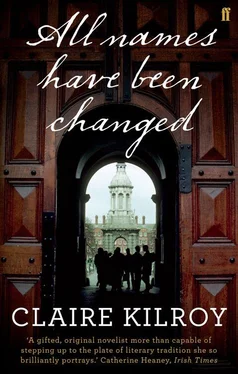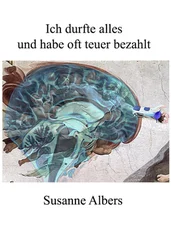Claire Kilroy - All Names Have Been Changed
Здесь есть возможность читать онлайн «Claire Kilroy - All Names Have Been Changed» весь текст электронной книги совершенно бесплатно (целиком полную версию без сокращений). В некоторых случаях можно слушать аудио, скачать через торрент в формате fb2 и присутствует краткое содержание. Год выпуска: 2010, Издательство: Faber & Faber, Жанр: Современная проза, на английском языке. Описание произведения, (предисловие) а так же отзывы посетителей доступны на портале библиотеки ЛибКат.
- Название:All Names Have Been Changed
- Автор:
- Издательство:Faber & Faber
- Жанр:
- Год:2010
- ISBN:нет данных
- Рейтинг книги:5 / 5. Голосов: 1
-
Избранное:Добавить в избранное
- Отзывы:
-
Ваша оценка:
- 100
- 1
- 2
- 3
- 4
- 5
All Names Have Been Changed: краткое содержание, описание и аннотация
Предлагаем к чтению аннотацию, описание, краткое содержание или предисловие (зависит от того, что написал сам автор книги «All Names Have Been Changed»). Если вы не нашли необходимую информацию о книге — напишите в комментариях, мы постараемся отыскать её.
All Names Have Been Changed — читать онлайн бесплатно полную книгу (весь текст) целиком
Ниже представлен текст книги, разбитый по страницам. Система сохранения места последней прочитанной страницы, позволяет с удобством читать онлайн бесплатно книгу «All Names Have Been Changed», без необходимости каждый раз заново искать на чём Вы остановились. Поставьте закладку, и сможете в любой момент перейти на страницу, на которой закончили чтение.
Интервал:
Закладка:
Faye had brought in a short story about two little old ladies attending a piano recital in the National Concert Hall on Earlsfort Terrace. The first section detailed the pains the pair took getting dressed up beforehand, their appraisals of their reflections in the age-mottled mirrors which had once held images of their girlhood selves, the admiring glances they hoped their elegant (if dated) clothes and jewellery might attract. They separately, in their respective homes, envisaged the entrance they would make, imagined themselves in various social contexts, rehearsed the lines they might deliver upon encountering old acquaintances not seen in years. The two old ladies realised that they were nervous. Recent unspecified losses had shaken their confidence, and this trip to the concert hall was to be their first night out in some time.
The pair arrived early and purchased interval drinks — one glass of white wine, a gin and tonic — before taking their seats up on the yellow balcony. The seats were excellent, commanding an impressive view, having been booked well in advance under the guidance of the nice man in the ticket office, who advised them to sit slightly to the left if they wanted to see the pianist’s hands (they had nodded their heads: yes please! ). The old ladies looked around to see who else was in, and were pleased to recognise more than a few faces, who recognised them in turn. Yes, it was splendid. The world had not changed as much as they’d feared. However — and there was always a ‘However’ in Faye’s work — as the two-minute curtain call sounded, another couple, a middle-aged man and his wife, arrived and hovered unhappily over the little old ladies, who smiled sweetly up at them, wondering if they were acquainted. Their faces didn’t ring a bell.
The couple looked at their tickets, then down at the little old ladies, then back at their tickets again. There were no empty seats left in the row. The man cleared his throat and mentioned that the two ladies were occupying his seats. The little old ladies blinked. How papery their powdered skin looked under the auditorium lights. Faye deployed a deft simile to capture their fright, though the phrasing escapes me now. Much bluster was to follow. The couple showed the old ladies their tickets, and, sure enough, this second set also read Row J, Seats 15 and 16. The old ladies declined to move. The middle-aged couple continued to unhappily hover. A hush fell over the rows behind. Two tickets for the same seat had been printed by accident, and the concert was a sell-out. What would happen next?
The middle-aged couple summoned the usher, a smart young woman, who, after a brisk examination of both sets of tickets, pointed out as tactfully as she was able that the old ladies’ concert wasn’t until the following evening. The little old ladies had to hurriedly collect their belongings and vacate the seats, as the recital was already late in commencing.
Faye’s evocation of their humiliation as they were escorted to the back of the hall was as masterful as it was poignant. Applause met their exit as the soloist appeared on stage (a violinist! — how had they missed the absence of a grand piano on stage?). It wasn’t until the two were travelling home in silence on the lower deck of the bus that they realised they’d forgotten their interval drinks. Each lady arrived at this discovery independently, but both made the decision not to mention it to the other. It was as complete an exposition of disappointment as I had ever read.
‘Would it not be better,’ Glynn suggested after some moments consideration, ‘if the usher pointed out that the two tickets were for yesterday instead? In your version, the two little old ladies get a second chance, because they get to do it all over again the following evening.’
There was a sort of collective aha in the room, causing our chairs to creak beneath us. Aha, of course, perfect. That was the difference between Glynn and an ordinary writer, that ability to locate tragedy in the inappreciable details. Faye pencilled in his recommendation.
Guinevere then read an extract from Hartman, the novel she’d been working on for some months, the eponymous protagonist of which was an ageing American insurance broker with a cardiac complaint, failed husband twice over and parent to three outstandingly disaffected grown-up children, none of them his own.
This willingness to explore a complete stranger’s messy and largely self-inflicted personal setbacks seemed less to me at the time an audacious act of imagining on Guinevere’s part — a young Irishwoman narrating the inner life of a decrepit Bostonian about whom she could have known next to nothing: Guinevere hadn’t even been to the States — than a touching act of compassion. Guinevere should have been more discerning with her pity and not squandered it on those undeserving few who could never get their fill of it, no matter how much she bestowed on them. I include myself in their number.
The extract she read was narrated in that effortless first-person narrative voice that flows so freely from the pens of the American prose masters, as if they didn’t have to do any actual work to get their novels onto the page, merely show up and turn on the tap, or rather faucet, and of whom all, Guinevere pointed out to me one night in the pub, were men. Good stuff, I thought. Proper order.
I made no attempt to engage with the argument because I did not want to discuss other men with Guinevere. I did not want her to discuss other men with me. The sole exception was Glynn. Perhaps, she confided in a confessional tone, this awareness of male primacy in the field explained the subconscious decision she must’ve made somewhere along the line to write in a man’s voice. It was as much of a surprise to her as to anyone, she maintained, when this lemon-aertexed American golfer with his Pepto-Bismol started speaking the minute she sat at the page. ‘The twentieth century novels of truly great stature,’ she noted with little pleasure, ‘come from the pens of male hands just as surely as sad songs are composed in a minor key.’
At this, Antonia practically sprang out of her seat. We hadn’t realised she’d been listening. We hadn’t realised they’d all been listening. Three appalled faces stared at Guinevere. ‘Virginia Woolf!’ Antonia proclaimed as an example of a female novelist of truly great stature, but the strained silence which ensued as she and the group struggled to produce another name indicated that Virginia, poor tormented, drowned Virginia, was the cautionary exception to the rule.
‘I would like to believe,’ Faye offered, ‘that the names of great twentieth-century female novelists do not spring as readily to our lips as those of their male counterparts simply because we haven’t heard of them.’
‘So would I,’ Guinevere replied flatly, her tone conveying that although she too would have liked to enjoy Faye’s benign belief, the stark facts of the matter denied her that luxury.
‘Am I doomed from the start?’ Antonia demanded. ‘Is that what you’re saying? Is that what you’re telling me? That I’m doomed in my literary endeavours from the outset because I’m female? That I may as well not bother?’ The blood had drained so thoroughly from her face that Antonia’s lips were the colour of skin, and her skin was the colour of bone. How unfamiliar she had suddenly become, and yet how genuine, as if the mask had finally dropped.
We were evidently in the grip of a serious crisis, and although I had no comprehension of the immense personal significance Antonia had clearly invested in the argument, the urge to defend Guinevere, who was sitting listlessly by my side, was at that moment overpowering. ‘Listen Antonia—’ I began, the adrenalin surging through my body, but then Aisling slammed her pint down with such force that it splashed all over the table.
Читать дальшеИнтервал:
Закладка:
Похожие книги на «All Names Have Been Changed»
Представляем Вашему вниманию похожие книги на «All Names Have Been Changed» списком для выбора. Мы отобрали схожую по названию и смыслу литературу в надежде предоставить читателям больше вариантов отыскать новые, интересные, ещё непрочитанные произведения.
Обсуждение, отзывы о книге «All Names Have Been Changed» и просто собственные мнения читателей. Оставьте ваши комментарии, напишите, что Вы думаете о произведении, его смысле или главных героях. Укажите что конкретно понравилось, а что нет, и почему Вы так считаете.












